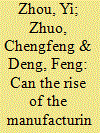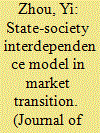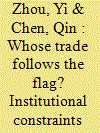|
|
|
Sort Order |
|
|
|
Items / Page
|
|
|
|
|
|
|
| Srl | Item |
| 1 |
ID:
179671


|
|
|
|
|
| Summary/Abstract |
China is the largest country in energy consumption and carbon emissions. At the same time, with the continuous rise of China's manufacturing value chain, the impact of the manufacturing value chain on energy conservation and emission reduction is a very necessary and key research. This paper theoretically analyzes the impact of value chain climbing in manufacturing industry on energy conservation and emission reduction, and empirically tests the relationship between the two. This paper further explores the transmission mechanism between the two, and analyzes the hierarchical heterogeneity of the manufacturing industry.
|
|
|
|
|
|
|
|
|
|
|
|
|
|
|
|
| 2 |
ID:
120817


|
|
|
|
|
| Publication |
2013.
|
| Summary/Abstract |
Based on first-hand field research data, this paper explores the construction of a 'Farmers' City' in Wenzhou in the early 1980s. It studies the actors, their relationships, and the institutions, and proposes a 'state-society interdependence model'. It concludes that the spontaneous, bottom-up urbanization process initiated by farmers as described in the texts was actually the win-win result of an interactive and interdependent relationship between the farmers and local government. The reasons are: (1) the actors, including the local government, the specialized farmers (zhuanye hu), and the other farmers, collectively owned, controlled, and obtained the resources; (2) in terms of the mobilization-response process, the close patron-client ties between the farmers and local government formed a strong interdependent relationship; and (3) in terms of the institutional reforms, the folk interests and demands were always a reference point for the local government. The farmers and their government were partners, participants, and practitioners in grassroots institutional reform.
|
|
|
|
|
|
|
|
|
|
|
|
|
|
|
|
| 3 |
ID:
182682


|
|
|
|
|
| Summary/Abstract |
This study revisits the association between bilateral relations and trade based on rare-event data from Integrated Data for Event Analysis (IDEA). Our results suggest that a country imports more from another if the two countries are friendlier. We further argue that states face two constraints when attempting to manipulate trade. First, they are constrained by domestic institutions such as elections and congress. Second, they are constrained by international institutions such as the World Trade Organization (WTO). Our results show that the imports of authoritarian countries follow the flag of politics, but democratic countries’ imports are less likely to be affected by bilateral relations. Moreover, WTO membership can gradually restrict democratic states from intervening on imports but has little impact on authoritarian governments.
|
|
|
|
|
|
|
|
|
|
|
|
|
|
|
|
|
|
|
|
|